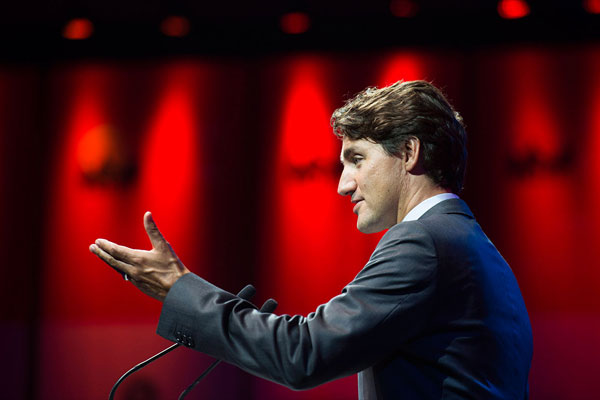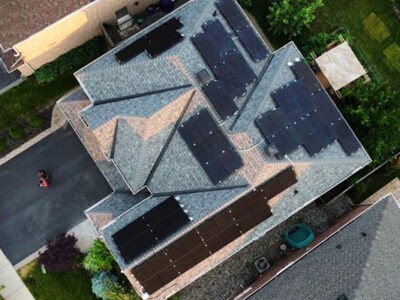It’s no secret that Canada’s position as a cleantech leader has weakened in recent years. Although the country’s cleantech industry has grown to about $12 billion, a recent report by Analytica Advisors concluded that Canada had since lost 71 percent of its market share for renewable energy and energy-efficiency goods way back in 2005.
So it comes as no surprise that many Canadians are hoping that the Liberal party’s landslide victory in October may revive the country’s struggling environmental policies and position Canada on top as an environmental leader, once again.
Justin Trudeau and his Liberal party swept to power in a stunning victory over the Conservative government of Stephen Harper, taking 184 seats. Canadians in every province voted for Liberal candidates, who won in striking victories in greater Toronto and Quebec.
David Suzuki, Canada’s environmental activist and TV personality, refused to endorse him and disagreed with Justin Trudeau on a host of environmental issues. But many pundits agree that a Liberal federal government would play a critical role in guiding Canada down a low-carbon path.
“Canadians voted for change, and change isn’t only about who sits in the Prime Minister’s Office. After nine years of Conservative rule, we need a federal government committed to reinvigorating our democracy, restoring environmental protections, and taking bold action on climate change,” said Joanna Kerr, executive director of Greenpeace Canada. “The Liberal government has an unprecedented opportunity to reject boom-and-bust polluting industries by stopping tar-sands expansion and making Canada a leader in renewable energies.”
Liberals are already providing prove that they can handle business. For example, Ontario’s Liberal Premier – Catherine Wynne is leading a set of policies to help roll out a province-wide Smart Grid program. This whopping $24 million initiative will fund energy storage, electric vehicle infrastructure, and micro-grids, creating more than 350 new jobs in the process.
“The Liberals campaigned on a platform that recognizes environmental protection and economic prosperity can go hand-in-hand, and that clean energy infrastructure is a key climate solution,” said Merran Smith, executive director of Clean Energy Canada, in an October 20th statement to the media.
Here is a point-by-point look at what the Liberal party promised during the campaign:

Liberal Leader and prime minister Justin Trudeau and part of his majority government. Credit: Liberal(dot)ca
• Invest an extra $100 million more in supporting clean-tech companies
• Shift federal subsidies away from fossil fuels and into renewables
• Create a $2 billion fund to support projects aimed at cutting carbon emissions
• Partner with the private sector to unlock venture capital
• Support energy efficiency and electric vehicles
• Work with the provinces to combat climate change through carbon pricing and developing green power sources
These are all very promising and positive points–however–for Liberals to push through with this agenda, they will have to do much more than just pour out federal subsidies for renewables. They will also have to create a national strategic plan – same as America’s Clean Power Plan with an ambitious goal to slash greenhouse gas emissions 32 per cent on 2005 levels by 2030, using clean energy outputs such as solar.
Liberals will have to push policy that funds the process to link up renewable energy grids between Canadian provinces. For example, B.C., with its massive hydropower potential, could act as a battery for Alberta, which boasts vast, solar and wind potential.
The Ontario government plans to spend up to $8.3 billion over the next five years on measures to reduce greenhouse gas emissions, according to the Liberals’ new climate change action plan.
Ottawa has already announced that it will invest $1.7-billion for climate and environmental protection within the next two years and an additional $1-billion in 2018-19 to establish a two-year, $2-billion low-carbon economy fund that will provide funding to provinces and territories that sign on to a national climate agreement. With this announcement and many others of the like, Trudeau is trying to keep up with his campaign promises, but has not moved yet to cut subsidies for the fossil fuel industry.
“With expectations still very high for this new government, the Liberals’ first budget is a welcome step in the right direction for Canadian climate change and environmental policy” says Hadrian Mertins-Kirkwood in an article published on the Behind The Numbers. “The budget claims that its green initiatives are just the start and additional actions are coming.”
Lets remember that with a firm majority and a clear mandate, the Liberal government now has an historic opportunity to restore Canada’s credibility as a climate leader, and grow their share of the global clean energy and technology market share. The Liberal government would need to forge the tools to drive efficient production and use of energy, reduce environmental damage, and develop breakthrough technologies to support new sources of low-carbon energy.
“It’s certainly true that in the past Liberal governments have not lived up to their promises on climate, but today we are in a very different situation, in terms of seeing the impacts and in terms of other nations like China taking action,” said Katharine Hayhoe, a Canadian climate scientist and commentator in a statement to Mother Jones.
It’s a different political climate internationally for climate change now than what it was nine years ago, the last time there was a Liberal government. May critics feel a lot more momentum, a lot more impetus, a lot more motivation for Liberals to take a stronger stand on this issue.
This will certainly give Justin Trudeau a mandate to make bolder choices, and positive climate change policy is one of the bolder choices he will make.
Lets hear from you. How would you say Trudeau and the Liberal Party have been fairing thus far?













Comments